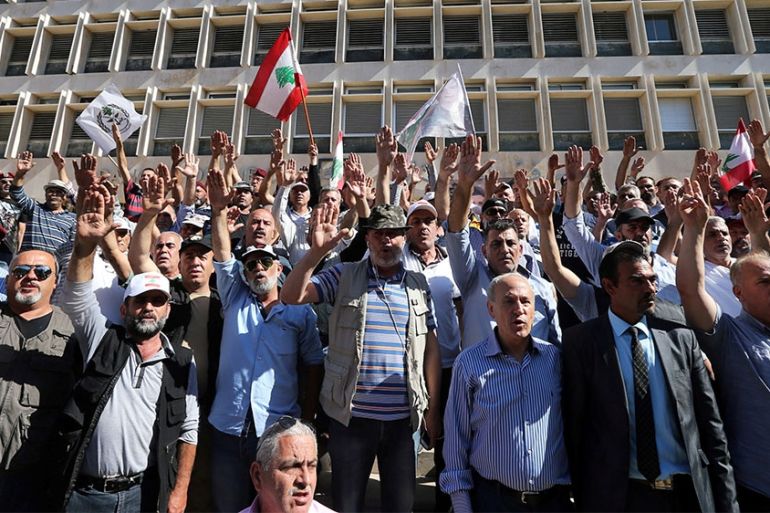Lebanon’s draft budget: A quick fix?
After 20 rounds of meetings, Lebanon’s cabinet finally agrees on a draft budget with steep spending cuts.

Lebanon finally has a 2019 draft budget. This is the government’s latest effort to reduce its ballooning deficit in order to access billions of dollars in loans from international donors. Parliament still has to approve the draft -and that could prove tricky because it not only calls for higher taxes but also deep spending cuts.
On Monday, after discussing the budget for 20 sessions, the cabinet in Lebanon agreed on the draft and sent it to parliament for ratification.
Keep reading
list of 4 itemsCanada’s Trudeau government asks rich to pay more in pitch to Gen Z
The Take: How much of Americans’ tax money funds war?
Spanish prosecutors accuse Real Madrid manager Carlo Ancelotti of tax fraud
Right now, Lebanon’s deficit is 11.5 percent of gross domestic product (GDP). The new budget would reduce the deficit to 7.6 percent of GDP. At a press briefing, the country’s finance minister, Ali Hassan Khalil, described the target ratio as a “satisfactory number”, adding that the government will aim for a similar deficit-to-GDP ratio in future budgets.
Maintaining that ratio will be critical for Lebanon as it tries to show international creditors it has the ability to service current and future debt payments. At 150 percent of its GDP, Lebanon has the third-highest debt ratio in the world, according to the International Monetary Fund (IMF).
To help the country’s ailing economy, international donors pledged an $11bn loan package to Lebanon in 2018 at the CEDRE (Conference economique pour le developpement) development and reform conference. However, that pledge came with strict conditions: in order to get the money, Lebanon must first prove it can rein in its public spending.
A growing list of critics
The draft budget’s cost-cutting measures have a growing list of critics in Lebanon. For over a month, retired army personnel and public-sector employees, including those of the central bank, have been protesting against the idea of slashing their retirement benefits in order to cut state spending.
On Monday as the cabinet met, army veterans took to the streets chanting slogans against the proposed three percent cut to their pensions – a measure that would supposedly be used to cover the cost of their healthcare. The retired army personnel dismissed that suggestion, saying that as soldiers, they are already entitled to free healthcare.
Lebanon President Michael Aoun urged politicians across political lines to refrain from “politicising” the proposed budget. Alain Aoun, an MP from the president’s party, the Free Patriotic Movement, told Al Jazeera that the draft will be studied by the finance committee and tabled in parliament for debate. It could take as long as a month to ratify it, Speaker Nabih Berri told the Daily Star, a local newspaper.
Jamil al-Sayyed, one of Lebanon’s controversial parliamentarians and a former head of Lebanon’s general security, told Al Jazeera he does not believe the finance minister will honour a promise to ring-fence public-sector employees.
“I think he is lying because now the ball is in the court of parliamentarians. He just does not want to confront these questions,” said Sayyed. “We will get back to the streets if that is the case.”
Under the proposed budget, parliamentarians will also have to personally tighten their belts. For example, they currently pay no customs taxes on imported cars. The draft budget would eliminate that perk.
Banks are alarmed
Naseeb Ghobril, head of the economic research and analysis department at Byblos Bank, said that the draft budget suggests increasing taxes on interest earned on bank deposits from seven to 10 percent. That’s the second hike in just two years. Such an increase, he said, would have a negative impact on Lebanon’s long-term economy.
“The tax hike on deposits will harm the income of thousands of Lebanese persons and families, as the interest earned on deposits is the only source of income to thousands of retired Lebanese,” he said. “This will lead depositors to put pressure on banks to offset the tax hike and compensate them by raising the interest rates on their deposits. When banks do this, it will automatically raise the interest rates on existing and new loans, which will increase the operating costs on companies and increase the cost of borrowing for individuals.”
As an alternative to raising taxes on bank-deposit interest, Ghobril said, the government should have brought in legislation to fight tax evasion, improve fee collection and control the border to prevent smuggling and fight customs evasion.
Banks and politicians sharing the government’s burden?
Economist Jean Tawile believes it would be fair for domestic banks “to share the government’s burden” by lending it money at a lower interest rate, but that “this only makes sense if it is accompanied by real and serious reforms to lower the deficit”. He added that this could work especially well “by decreasing the size of the public sector, where 39 percent of expenditures go to salaries in the public sector”.
Since September 2017, Lebanon’s government has employed around 10,000 people, according to Tawile, who stresses that is a breach of article 21 of the law 46/2017, which calls for a freeze in public-sector employment.
Economists argued that in a political system like that of Lebanon – where power is shared on a sectarian basis – elected officials do not want to freeze public-sector hiring because it might reduce their chances of getting re-elected.
While the proposed budget might make it possible for Lebanon to access money from international donors, critics call it the “easy way”. They prefer meaningful reforms to a quick fix.